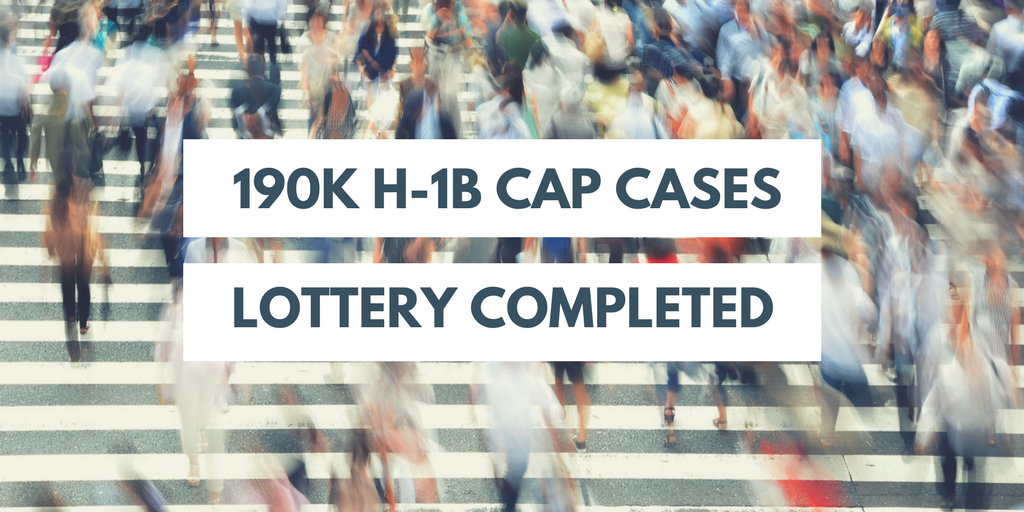Alert: FY2019 H-1B Cap Demand Very Strong; Random Lottery Just Completed
Our office just learned that the U.S. Citizenship and Immigration Service (USCIS) has completed the intake and processing of all of the fiscal year (FY2019) H-1B cap petitions. According to USCIS, there were over 190,098 H-1B cap petitions filed during the April 2nd-6th filing period. This indicates that the number of H-1B cap filings this year is slightly lower than the number of H-1B cap filings during last year’s cap season (199,000); nonetheless, this marks continuing very strong H-1B cap demand. The H-1B cap lottery has also been completed.
The Lottery Has Been Completed
USCIS also just announced that they have just completed the computer-generated random selection process, or lottery, to select these petitions which would be reviewed to meet the 65,000 general-category cap and the 20,000 cap under the advanced degree exemption. The process involved running the random selection for the advanced degree exemption (20,000) first with all remaining nonselected advanced degree petitions then becoming part of the random selection process for the 65,000 limit.
This means that the chance of an H-1B petition to be selected under the random H-1B lottery is around 35% (slightly higher for US master’s degree or higher holders).
Next Steps and Timelines
Regular Processing Receipt Notices. We expect that USCIS will immediately start issuing receipt notices for cases selected under the random lottery. Since there is no premium processing for H-1B cap cases this year, our expectation (and hope) is that we should get receipt notices for selected cases issued within the next few weeks and hopefully by early to mid-May, USCIS will complete issuing the paper receipt notices indicating acceptance under the lottery for regular processing H-1B cap cases.
H-1B Lottery Rejection Notices. The H-1B lottery rejection notices are likely to be processed afterwards, and given the fact that there will be about 105,000 such rejection packages, we expect that rejection packages will be sent out in late May or even June.
H-1B Cap-Exempt Petitions Still Accepted
It should be noted that USCIS continues to accept cap-exempt H-1B petitions. These are petitions generally filed by universities and non-profit research organizations (read more about cap-exempt employers). Also, H-1B extensions and H-1B transfers and concurrent H-1B petitions for a second employer are cap-exempt and can be filed at any time and outside of the H-1B cap filing season.
Conclusion
The FY2019 H-1B cap numbers are not very surprising to our office based on the demand we saw during the January-March H-1B cap preparation period. The reasons for the high H-1B demand this year may be caused by the improving economy and also companies and candidates rushing to file H-1B applications under the current system before the new administration implements any changes.
We will continue to monitor developments related to this year’s H-1B cap filing season. In the meantime, please feel free to subscribe to our free weekly newsletter to obtain developments on this and related topics. If our office can be of any help, please feel free to contact us.
Related News and Articles
The Capitol Immigration Law Group has been serving the business community for over 15 years and is one of the most widely respected immigration law firms focused solely on U.S. employment-based immigration. Disclaimer: we make all efforts to provide timely and accurate information; however, the information in this article may become outdated or may not be applicable to a specific set of facts. It is not to be construed as legal advice.

